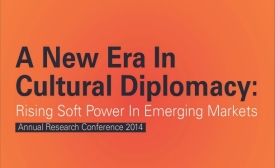Cultural Diplomacy
It's often said that the closest interaction many Americans have with other countries' cultures is through food. That kind of culinary diplomacy is particularly common in Washington, D.C., where immigrants from all over the world have cooked up a diverse food scene.
Mexican food has suffered an image problem. When people say they want Mexican food they think fajitas, or hard shell tacos, or chile con queso. These “Tex Mex” fast food interpretations discredit a cuisine that has arose from ancient civilizations that pre-date the arrival of the Spaniards.
In this video, The First Lady of China, Peng Liyuan congratulates the naming of the Smithsonian’s National Zoo’s giant panda cub. The First Lady gives a warm thanks to the Smithsonian for their shared love pandas. She states, “For over thirty years China and the United States have carried out a lot of successful cooperation in panda protection. May the friendship between the Chinese and American people grow even stronger!”
For all the official rhetoric about the need for Kansai’s prefectures to set themselves apart from each other, let alone from the rest of the country, the local bureaucracies too often have a herd mentality when it comes to planning and promoting tourism campaigns.
Monzer Darwish is a 23-year-old graphic designer and metal fan from Al Salamiyah, Syria, a district near Homs. For the last five months he’s been travelling around the country and visiting refugees in Lebanon for a documentary he’s making about underground metal bands in war-torn Syria. Needless to say, it's a tough gig.

Cultural diplomacy is often conceived of as part of a country’s foreign relations, in that cultural dialogue can sometimes achieve what political dialogue cannot. It is an example of “soft power”― the possibility of communicating through culture and ideas to achieve national interests.
In an increasingly distributed global system, emerging-economy countries are now paying greater attention to culture and communication as part of the symbolic domain of their national power in global affairs. But their efforts remain little understood or even noted.
One of the odder phenomena of the last decade is hearing national security elites, terrorism experts, and career diplomats discuss the finer points of “flow,” “bling,” and the “politics of cool.” American and European terrorism experts have increasingly expressed concerns over “anti-American hip-hop,” accenting the radicalizing influence of the genre.
It’s the smallest and most obvious thing, and yet my life was at stake: I had to learn to look to the right when crossing the street. That’s my first memory when I think back on the exchange program I attended in the United Kingdom as a junior in college. Like everyone who takes the big jump into studying abroad, I was immersed in a different culture full of new people, foods, and sounds.







